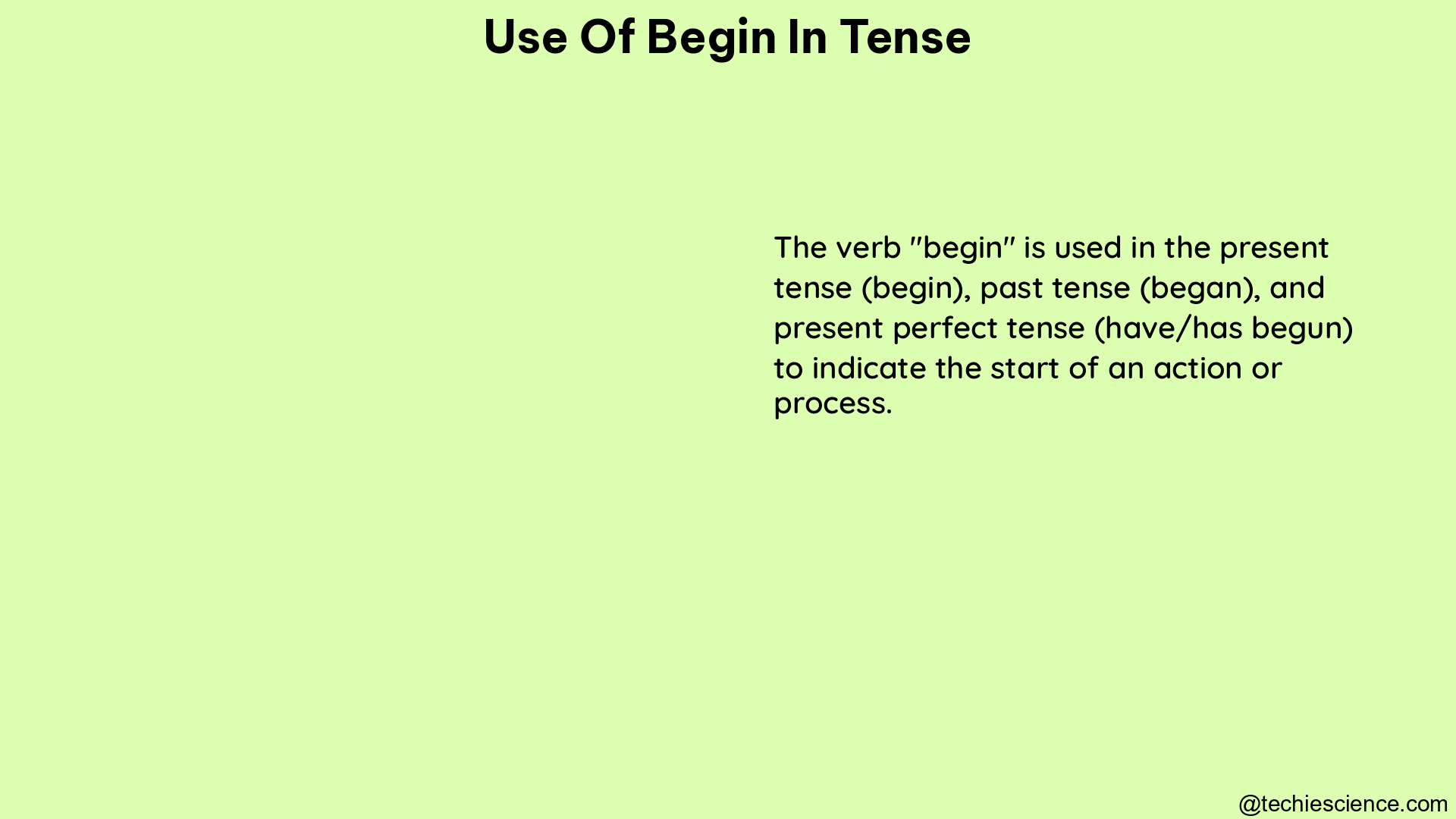The verb “begin” is an irregular verb in English, which means its conjugation does not follow the standard pattern of adding -ed to form the past tense and past participle. Instead, “begin” has distinct forms for each tense, and understanding the proper usage of these forms is crucial for effective communication.
The Present Tense of “Begin”
The present tense of “begin” can take two forms, depending on the subject:
- First Person, Second Person, and Plural: The verb “begin” is used for the first person (I), second person (you), and plural (we, they) subjects.
-
Examples:
- I begin my day with a cup of coffee.
- You begin your new job tomorrow.
- We begin our journey at sunrise.
- They begin their vacation next week.
-
Third Person Singular: The verb “begins” is used for the third person singular subjects (he, she, it).
- Examples:
- He begins his presentation with a joke.
- She begins her workout routine at 6 AM.
- It begins to rain as we step outside.
The Past Tense of “Begin”

The past tense of “begin” is “began,” and it is used to describe actions that started and finished in the past.
- Examples:
- I began my research last week.
- You began your new job in January.
- He began his new hobby a few months ago.
- We began our vacation with a road trip.
- They began the project last year.
The Past Participle of “Begin”
The past participle of “begin” is “begun,” and it is used to describe actions that started in the past and may continue into the present or have ongoing effects.
- Examples:
- I have begun my research on the topic.
- You have begun your new job, and you seem to be enjoying it.
- He has begun his new hobby, and he’s already quite good at it.
- We have begun our vacation, and we’re having a wonderful time.
- They have begun the project, and they’re making good progress.
Comparing “Began” and “Begun”
It’s important to understand the difference between “began” and “begun” to use them correctly in your writing and speech.
- Began is used for actions that started and finished in the past.
-
Example: The meeting began at 10 AM and ended at 11:30 AM.
-
Begun is used for actions that started in the past and may continue into the present or have ongoing effects.
- Example: The meeting has begun, and the participants are discussing the agenda.
Examples of “Begin” in Different Tenses
Let’s look at some examples of how “begin” can be used in different tenses:
- Simple Present:
- The show begins at eight o’clock.
-
The new school year begins in September.
-
Simple Past:
- The discussion began heatedly.
-
The construction began last month.
-
Past Participle:
- The construction had begun by the time we arrived.
-
The project has begun, and the team is making progress.
-
Present Perfect:
- She has just begun a new novel.
-
They have begun their vacation in Hawaii.
-
Past Perfect:
- They had already begun the project by then.
-
The company had begun its expansion plans before the pandemic.
-
Future Perfect:
- By next week, we will have begun the process.
- By the end of the year, they will have begun construction on the new building.
Key Points to Remember
- Began is used for actions that started and finished in the past.
- Begun is used for actions that started in the past and may continue into the present or have ongoing effects.
- Begin is used for actions that are happening now or will happen in the future.
Conclusion
The proper use of “begin,” “began,” and “begun” is essential for clear and effective communication in English. By understanding the distinct forms and their appropriate usage, you can enhance your writing and speaking skills, ensuring that your message is conveyed accurately and precisely.
Reference:
- https://www.grammarbook.com/blog/verbs/began-vs-begun/
- https://study.com/academy/lesson/video/when-to-use-begin-began-or-begun.html
- https://www.dictionary.com/compare-words/began-vs-begun
Hey! I am Arpita Bose Roy. My qualifications are M.A. in English with B. Ed. in both general education and special education. I have 2 years of experience as a “language analyst” at IIT Kharagpur and 4 years of experience as an “Academic Content Developer” at IIT Kharagpur. Currently, I am working as an academic writer at Lambdageeks.